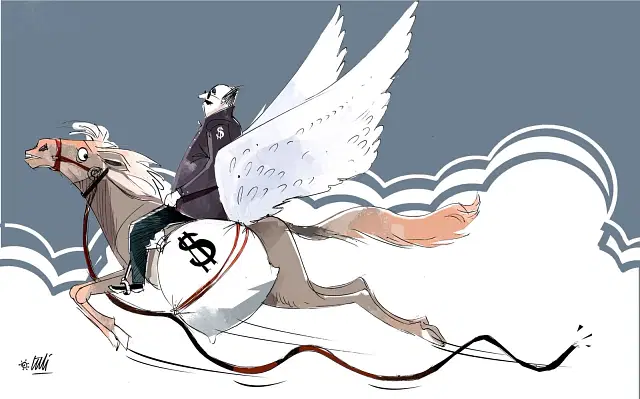
Workers were the first to leave Bangladesh. But they send remittance and eventually return to the country. They are the hope of the country. We heard artistes can sense the future. Since the 90s there has been an exodus of writers, artistes and singers from the country, leaving Bangladesh culturally weakened.
Then the wealthy people started leaving. In the beginning, they would travel back and forth, having one foot in the country and another overseas. Now most of them have settled abroad permanently. Except the expatriate labourers, most of the others deposit the wealth they made in the country, abroad. They do not create jobs or generate more wealth, as their money is not being reinvested in the country.
The problem can no longer be seen as a problem of corruption only. This is about the existence of the country. Keeping aside the political considerations, the question could be asked from pure economic grounds as well: when do the rich and powerful people of a country consider it not suitable to stay in the country?
Recently, foreign minister AK Abdul Momen said that they have learned that the government officials outnumber politicians in siphoning off money. He said, “We’ve found primarily found this to be true. We thought the number of politicians would be higher, but we saw only four are politicians. Most of them are government officials. There are some businesspersons as well.” They have information about 28 incidents only, but this indicates that not only the loan defaulters and unscrupulous businesspersons, but many government officials also have made ‘Begumpara’ their destination. This exodus is not to bolster their earnings through business or jobs. This is to siphon off their wealth overseas.
According to Global Financial Integrity (GFI), a Washington DC-based research firm, around US$ 6 billion was siphoned off from Bangladesh through underhand business manipulations in 2015. According to United Nations Conference on Trade and Development (UNCTAD), in 2015, around 36 per cent of Bangladesh’s tax money was siphoned off.
It is not only the ‘begums’ the ‘sahebs’ who are deciding to stay outside of the country. A number of big business conglomerates have been shifting their business and offices to Singapore, Thailand and Malaysia. Many have shifted their wealth to Europe, America, Canada and Australia. This is not only unique to the rich people of Bangladesh. This tendency is prevalent among the rich of the developing G-77 countries, said Transparency International.
We can understand the explanations of why poor people cross the borders, why they roam around in forests and seas. They leave their countries due to lack of proper jobs or there is no scope to change their lot in life with the available opportunities. Maybe some have sellable land but no sure scope for investment. Still, this exit of poor people is not forever. Almost all the expatriate workers return home one day. But the chance of these ‘elite’ people returning is slim. People like PK Halder, who have embezzled a huge sum, might return when they find it convenient. But many might never return to face the allegations of embezzlement.
Does this mean, the elite class of this country think there is no future of this country? Their money made in this country is no longer safe here? Or, whether they have committed so much corruption that they are leaving the country fearing any future accountability? Are they no longer think this country as their? Is this the reason of the birth of ‘Begumpara’?
Economists have detected three scales of corruption. The last stage is systemic or endemic corruption. Capital is shifted to safer countries when the law, politics and administration and security system of the country collapses. The elite find the tools that they used for corruption and embezzlement faulty for the safekeeping of their wealth. They seek citizenship and invest in those countries that are known for strict law enforcement. The irony is, the people who destroyed the system of the country through their unlawful personal gains, head for safe and developed countries to secure their wealth.
The migration towards Begumpara displays the miserable failure of our anti-corruption laws and the drives.
In Kolkata in the nineteenth century, scholars like Raja Ram Mohan began to think that the ‘civilised’ and ‘enlightened’ English would one day settle in this country permanently. They would not think of India just as a money-making machine or a crown of their empire. They will start thinking of India as their homeland and will work for the welfare of the country. The reality of that dream has vanished. The British Raj has exploited the wealth of rich Bengal and India leaving an everlasting pattern of lifelong poverty and socio-political conflict.
The preachers of development will leave the country. But those who have no other place to go to, will need a reality where money can be made legally and there will be opportunities to invest and make profit. When employment will be created in this way, young people will not longer cross the Mediterranean or roam the jungles of Bosnia for better fortune.
The story of Begumpara is not a story of mere corruption, it is a sign of reaching the pinnacle of corruption. It is like the story of killing the goose that lays golden eggs. The migration to Begumpara is an indicator of true institutional collapse. There will be no other way to prevent institutional collapse if this mercury rises further. The future of those whose destination is Begumpara and of whose destination is Bangladesh, cannot be similar at all. If the vampires of Begumpara continue to suck the blood of the economy, hope for the future of Bangladesh will dwindle.
* Faruk Wasif is an assistant editor of Prothom Alo and a writer. He can be reached at faruk.wasif@prothomalo.com. This article has been rewritten for English edition of Prothom Alo by Shameem Reza and Farjana Liakat









